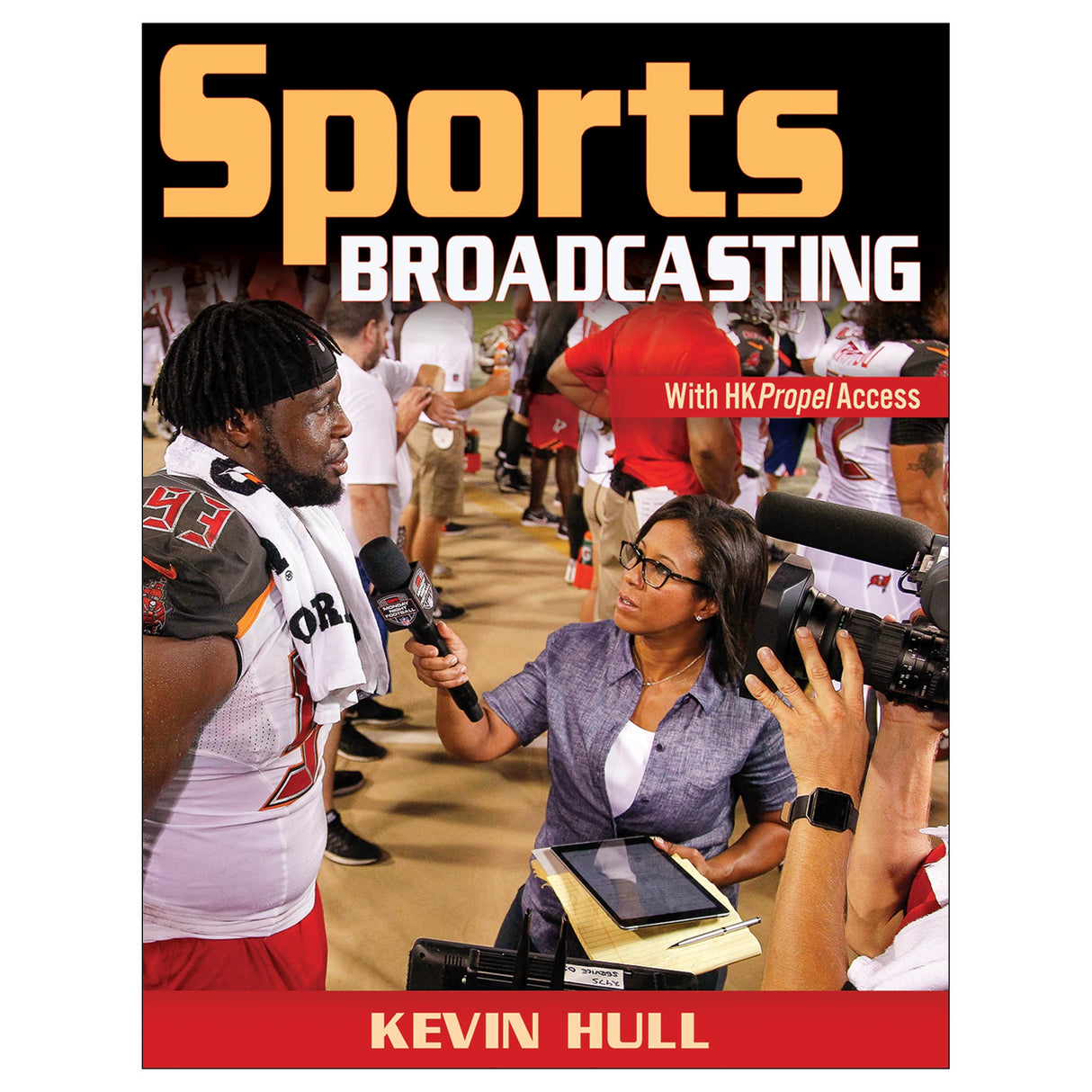Sports Broadcasting With HKPropel Access
Author: Kevin Hull
$99.00 USD
The text begins with the history and background of the sports broadcasting industry. Students will next learn about modern topics that are critical in the business today, with an overview of the various outlets, including television, radio, streaming, and podcasting. They will then dive into lessons on the skills every sportscaster needs for success, including conducting in-person and remote interviews of coaches and players, writing for broadcast versus writing for other channels such as web and mobile devices, shooting games or events, producing a sportscast, and editing video for broadcast.
The career demands of both television and radio broadcasting are explored, and the increasing popularity of podcasting and streaming is examined. Students will journey through the steps involved in preparing for a live sports production, including play-by-play for radio and television, color commentary, and sideline reporting. A look into the different types of social media and their impact on sports broadcasting is followed by tips and advice on creating an effective social media presence and best practices for using social media as a sports broadcaster. The final chapters prepare students to pursue a career in sports broadcasting—offering practical advice on preparing resumes, portfolios, and job searching—and discuss issues and ethics relevant to modern-day sports broadcasting.
Throughout the text, Major Moments sidebars discuss defining moments in the history of sports broadcasting and their impact on the field today, while Pro Advice sidebars feature interviews with sports broadcasting professionals and offer career tips and practical advice.
Related online learning aids and activities delivered through HKPropel further the learning experience. These include key term flash cards and downloadable worksheets. Video lessons and audio clips demonstrate skills covered in the text, such as setting up for an interview, capturing footage with a cell phone camera, and preparing for a broadcast. Student activities related to the video can be assigned and tracked by instructors through HKPropel, while writing prompts and a video editing assignment provide valuable hands-on experience in tasks students will need to be successful in their careers.
With Sports Broadcasting, students will gain the knowledge and practical skills they need to be a well-rounded broadcaster in any segment of the field.
Note: A code for accessing HKPropel is included with all new print books.
Audience
Undergraduate level textbook for courses on sports media or sports broadcasting.The Beginnings of Sports Broadcasting on Radio
Early Days of Sports Broadcasting on Television
Impact of Cable Television
The Internet
Summary
Chapter 2. Business of Sports Broadcasting
Ratings
Why Live Sports?
Rights Deals
The Olympics
Cable Fees
Cord Cutting
Summary
Chapter 3. Types of Sports Broadcasting
National Television
Local Television
Sports Talk Radio
Podcasting
Internet Streaming
Team Media
Live Sports Production
Summary
Chapter 4. Interviewing
Types of Interviews
Conducting the Interview
Shooting the Interview for Television
Interview Access
Summary
Chapter 5. Writing for Broadcast
Types of Stories
Broadcast Writing Style
Using Sound Bites
Writing Different Types of Scripts
Script Formatting
Example of Scripts
Summary
Chapter 6. Writing for the Web and Mobile Devices
Increased Importance of the Web
Writing the Story
Writing for Online
Writing Style for the Web and Mobile Devices
Associated Press Style
Rewriting a Story from Broadcast to Print
Summary
Chapter 7. Shooting Games and Events
Types of Shooting
Shooting Highlights
Shooting Events
Shooting Strategies
Types of Shots
It’s Time to Shoot!
Broadcasting Full Games
Summary
Chapter 8. Television Broadcasting
Local or National?
Producing a Sportscast
Editing Video
Anchoring the Sportscast
A Day in the Life of a Local Sportscaster
Summary
Chapter 9. Radio Broadcasting and Podcasting
Radio Stories
Sports Talk Radio
Podcasting
Summary
Chapter 10. Live Sports Production
Play-by-Play
Before the Game Starts
During the Game
Radio Versus Television Play-by-Play
Role of the Color Commentator
Role of the Sideline Reporter
Homer or Impartial?
Behind-the-Scenes Jobs of Live Sports Production
Summary
Chapter 11. Social Media
Blogs (The Old Social Media)
Types of Social Media
Social Media Lingo
Impact of Social Media on Sports Broadcasting
Setting Up a Social Media Account
Proper Use of Social Media
Social Media Policies
Social Media in Action
A Week of @CollegeGameDay
Athletes and Social Media
Summary
Chapter 12. Careers in Sports Broadcasting
Be Realistic
Getting Relevant Experience
Networking
The Written Resume
The Resume Reel
The Online Portfolio
Social Media
The Job Search
Summary
Chapter 13. Issues and Ethics in Sports Broadcasting
Coverage of Race, Gender, and Sexuality
Women in Sports Broadcasting
Racial Minorities in Sports Broadcasting
Stick to Sports
Ethics in Sports Broadcasting
Summary
How to start a podcast
Resume reels for broadcast
Tips for writing for broadcast
All ancillaries are free to adopting instructors through HKPropel.
Instructor guide. Includes an introduction, a sample syllabus, and suggestions on how to use the student activities in HKPropel. Solutions for the assignments and answers to the review questions in the book are provided, and writing and editing prompts will help the instructor test students on the materials taught in the book.
Instructors also receive access to all student materials in HKPropel. For Sports Broadcasting, this includes key term flash cards, downloadable worksheets, video lessons, and audio clips that demonstrate the practical skills covered in the text. Accompanying student activities can be assigned and tracked by instructors. A video editing assignment featuring raw footage from a college softball game provides a hands-on opportunity for students to practice editing skills.





